 |
| China/中国 [Google Images] |
As you can probably tell, China is a ways way from Puerto Rico. China has a VERY rich and diverse culture, language, food, and anything else you can basically think of. Many people clump “China” into one big mass but in reality the country is not only big in size but also differences. For example, many in China speak Mandarin or what is also known as “普通话” (Pu3tong1hua4*) which is the Standard Chinese used amongst many people to communicate. *The numbers next to each word represent tones in the words, an important aspect of the Chinese language* However, there are many other languages and dialects, for example: in New York we hear a lot of Cantonese from Southern Chinese immigrants but also dialects from TaiShan (台山), FuZhou (福州), and many others. As you can see, Chinese uses a character system, one of the oldest and still functioning writing systems in the world. Another misconception is that Chinese is a “pictographic” language, meaning that it was built off images. Though it may be true for some of the basic initial characters such as 日(ri4 – sun), 月 (yue4 – moon),馬 (ma3 – horse) ,上 (shang4 – above),and 下 (xia4 – below) many other characters developed very differently and have no associating to a “picture”. It is a complex language, yet a beautiful and proud one. Also, a cool fact is no matter what language or dialect you speak of Chinese, you are able to read and use (most) of the characters. So while a northern Beijing Mandarin speaker will say and read “你好” (ni3hao3), a southern Cantonese speaker will say and read “你好” (nei5hou2).
Many Chinese immigrants can be found in diverse parts of the world, they can be found in parts of Eastern Africa, Caribbean islands such as Jamaica, and in parts of South America like Guyana. They are known for being hard workers who traverse the world looking for new opportunities to better their lives and the lives of their kin. The same is true for those that came to Puerto Rico! You can see Chinese descendants on the island working diverse jobs and mixing their culture with the Puerto Rican one (try some Chinese food in Puerto Rico, their way of making rice is out of this world!). There’s even a WikiPage on Chinese Immigration to the island and things such as the Chinese Exclusion Act of 1882 could have been one of the driving forces to bring the Chinese to Puerto Rico and other islands.
一个中国人在 波多黎各里 (A Chinese Man in Puerto Rico)
One Chinese man I came across in multiple records was named “Lucas Yon”, and the first record he can be found is the 1910 Census.
 |
| Lucas Yon – 1910 Census [Ancestry] |
Interestingly enough Lucas seems to have integrated himself fairly quickly seeing as how by 1910 he was married with a Puerto Rico women and having already 11 children with her! Lucas Yon had married Alejandra Rodríguez Nieves, a native of Puerto Rico around 1887 and produced many children: Pablo, Esperanza, Aleja, Lucia, Angela, Diomedes, Lucas, Rafael, José (living with their parents in 1910). Lucas is said to have arrived on the island in 1880 therefore missing the window of the Cedula de Gracias which brought many foreigners to the island. By 1920 Lucas had moved on to a second relationship with a woman named María Ortiz and they are “CC” which means they aren’t married through the church. They have four children by the 1920 Census: María, Josefina, Salvador, and Estel. As you can see, Lucas Yon had many children!
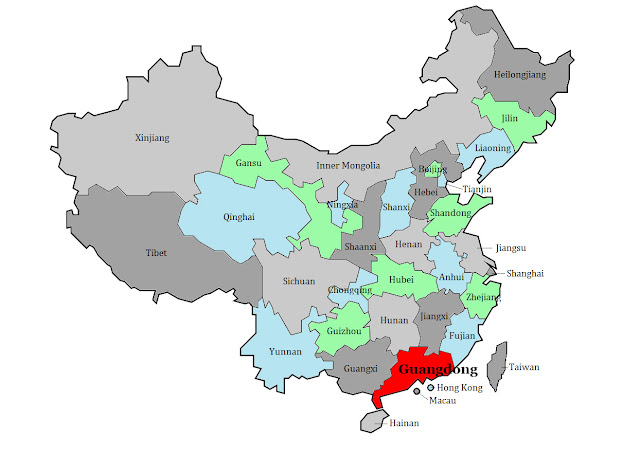 |
| Guangdong (广东) [Google Images] |
It seems that there were many immigrants from this area of China that have traveled around the world, my own cousins have ancestors from this region of China in their family tree. As I mentioned earlier, each region of China speaks a different dialect/language and not just “Mandarin”. So here you can find people that speak for example Cantonese (广东话) and Hakka (客家话) as their first tongue. Most likely Lucas Yon spoke one of these but could have also had a working knowledge of Mandarin.
It is interesting to have Lucas’ parents names and I’ll analyze that with the knowledge I have of Chinese. We can see that Lucas mentions his parents as “Yon Yin” and “Can Bú” and you might be asking yourself, “Why was Lucas’ father’s first name ‘yon’ when that was their surname?”. In China, it is tradition to carry your surname first, therefore someone like Yao Ming (姚明) isn’t named Yao and surnamed Ming, if not the opposite! His surname 姚 (yao2) is carried first while 明 (ming2 - bright) comes second. In this case Yon Yin would mean that “Yin” was his father’s first name and Yon was carried first in the Chinese tradition. This could also mean that “Can” was his mother’s surname and “Bu” was his mother’s given name from what he know about Chinese names.
Yet “Yon” and “Can” make me wonder what their characters would be. “Yon” to me seems like a warped version of “Yong” also spelled Yeong, or Young in romanized Latin. A quick search into Chinese surnames pulls up the surname “Yang” (惕) and as you can see there are various ways to pronounce or write the character with Latin letters. We don’t know if Lucas’ surname could be this in Chinese but it’s definitely a possibility. In the variants list you can see “Yong” listed for Hakka, which as you know is found in Guangdong. It is possible that the “G” was dropped by Puerto Ricans, and a possible linguistic reason is that we Puerto Ricans take our final “N”s and add a “ng” sound to it, so while other Spanish speakers may say “pan” ours sounds slightly more like “pang”. Therefore when they heard “yong” they interpreted “yon”. Just a theory of course!
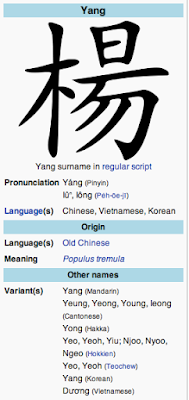 |
| Yang (惕) [Wikipedia] |
Now his mother’s surname isn’t as easy to crack I would say! In regular Mandarin romanized spelling, the “C” is used to mark a “TS” sound. So a word like (菜) meaning “dish” would be romanized to “cai4” though its actual pronunciation would be “tsai”. I doubt they knew this in Puerto Rico at the time and so we can deduce that his mother’s surname was pronounced “Kan” rather than “Tsan”. Which now presents to us a problem, is the surname similar to “yon” having potentially dropped a “g” therefore leaving us with “kang” or is it still “kan”. Both surnames can be found in Chinese, and looking at this table below we can see again a Hokkien and even Cantonese influence on the surnames.
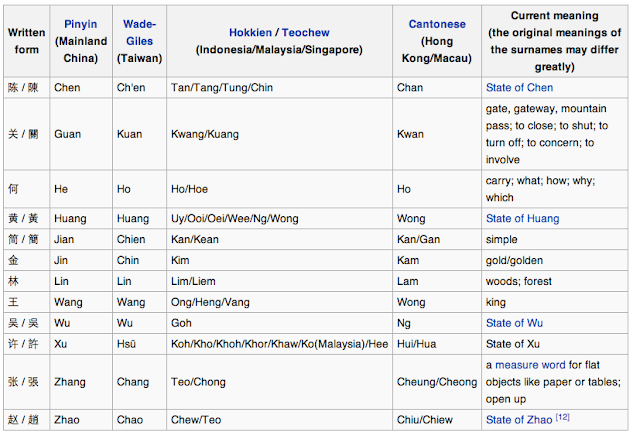 |
| Chinese Surnames [Wikipedia] |
So the surname “Jiang” in Mandarin can be “Kan” in Hakka or even “Kan/Gan” in Cantonese. Or could the surname be “Kang”? There is also the possibility that his mother’s surname was “Bu” as well which a quick search shows me the surname (武) pronounced “wu3” in Mandarin but “Bú” in the Min Nan dialect.
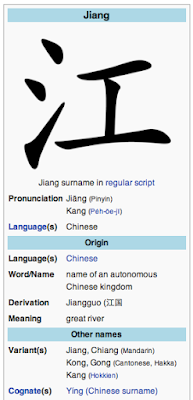 |
| Jiang (江)[Wikipedia] |
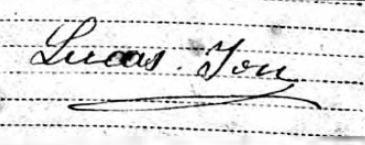 |
| Lucas Yon – signature [Ancestry] |
As you can see tracing people out of Puerto Rico from non-Spanish backgrounds can be messy sometimes! Even with English surnames such as “Murphy” we see a change to “Morfi” on the island, so imagine a Chinese name based on a completely different script!
By 1930 we know that María Ortiz Acosta is widowed of Lucas Yon, yet I haven’t been able to find his death record! Hopefully on there we would get more information into possibly his town of origin in China, though I do doubt it since his children might not have known. It has been interesting exploring this man’s life and possible origins in China and hopefully this maybe some new information to a Lucas Yon descendant!
[UPDATE] After using his grandchildren’s records to see when Lucas died I was able to bring it down to 1924-1928 in Cayey, after searching those years I was able to find his death record!
He was recorded as “Lucas Yon Bu”, seventy years old, a native of Canton, China, divorced living on Calle José de Diego in Cayey, Puerto Rico. His cause of death is listed as “fiebre tifoidea” or Typhoid fever and he passed on the 3rd of June 1925. It mentions his parents as “Yon Yin” and “Can Bu”, also natives of Canton, China and deceased by 1925.
As you can see it is possible that his mother was either “Can” (Kan” or “Bu”, since his father is still listed as “Yon Yin” I would wager that “Can” is the surname but with Puerto Rican records you never know! At least we have his death record now, if only his grandparents were listed — that would have been a treasure!
